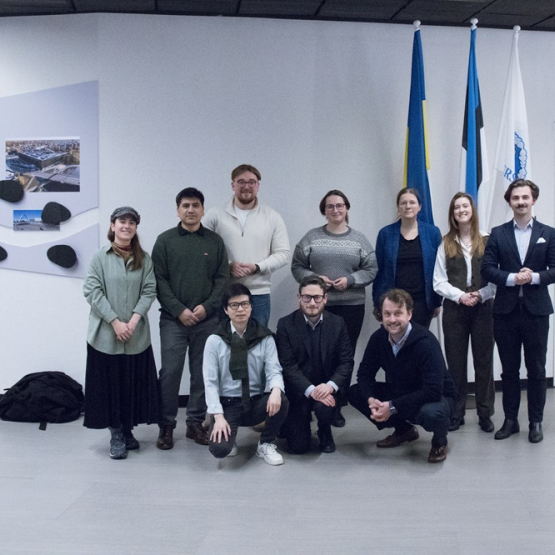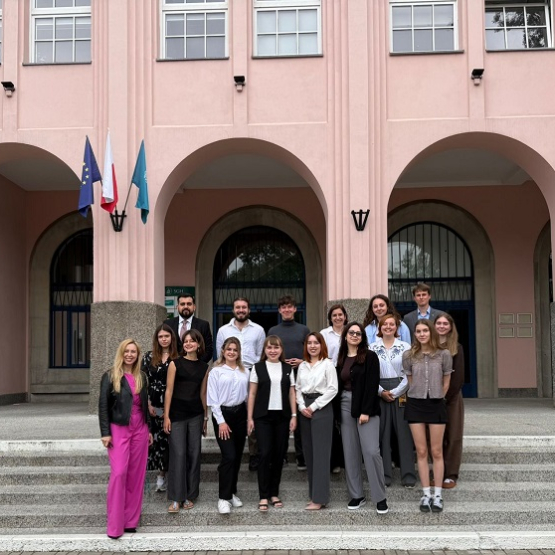International accreditations as an example of best practice in university management
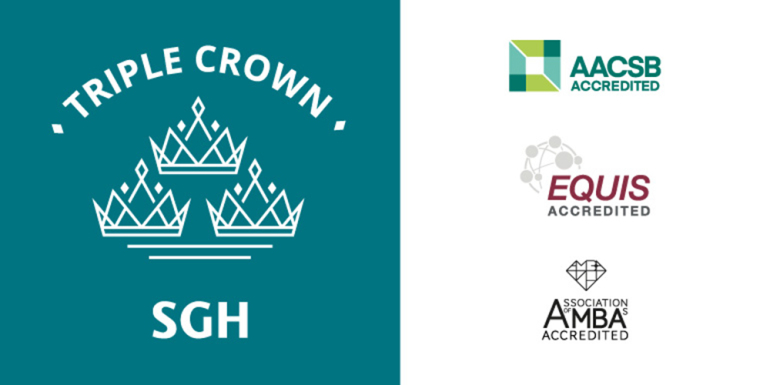
“We have won a triple crown,” Habilitated Doctor Marcin Wojtysiak-Kotlarski, Professor at SGH, Head of the SGH Team for AACSB, EQUIS and BGA Accreditations, writes about the experience from the implementation of accreditation projects, which provide an opportunity to benchmark with the best university management practices in the world, and also about plans for the future.
On 18 April 2025, AACSB International officially announced that the SGH Warsaw School of Economics received the AACSB accreditation. Thus, SGH has joined a very small group of economic universities in the world with a triple crown, i.e. three most important accreditations: AACSB (Association to Advance Collegiate Schools of Business), EQUIS (European Quality Improvement System), and AMBA (Association of MBAs) .
According to the current data, there are only 136 triple-accredited higher education institutions. It is estimated that only about 1% of business schools in the world belong to this elite group.
For our university, winning the triple crown was one of the key strategic goals that we have been consistently pursuing for several years. We obtained the AMBA accreditation in 2016, then the EQUIS accreditation in 2021, and now – in 2025 – the AACSB accreditation. We are very pleased with this success. Major international accreditations confirm a high SGH status on the map of world business schools.
We have achieved this together, thanks to the involvement of many stakeholder groups: teaching and administrative staff, students and doctoral students, business representatives, alumni, members of the University Board and members of the International Advisory Board. Naturally, this success would not have been possible without the support SGH top leadership as well as the coordinating role of the accreditation team. We can all be extremely proud of this achievement.
***
International accreditation is a topic which many people seem to consider mysterious. This text is intended to bring it closer to the academic community and to invite a wide range of stakeholders of our University to cooperate in this area. Accreditation (from French accréditer) means – if translated directly – granting a power of attorney. The term accreditation refers to a procedure in which an authorised body issues a statement that the entity is competent to perform specific tasks.
In general, the accreditation processes in the best contemporary educational institutions consist in decisions made by universities to voluntarily undergo the assessment of institutions considered to be the world’s leaders in this area. They do this in the belief that accreditation successes make their universities more credible in the eyes of students from all over the world who are looking for the most valuable educational opportunities for themselves. In this sense, the most important accreditations undoubtedly have an important strategic aspect related to competition on the higher education market.
SGH is one of the leading business schools in Central and Eastern Europe. At our university – in addition to courses closely related to management, accounting and corporate business – there is also a well developed component of economic and social sciences, which educate our students in a broader sense. For the community of our Alma Mater, it is extremely important to provide students with knowledge not only narrowly focused on running businesses and making money. The process of shaping leaders is one of the foundations of our university identity.
It is also worth noting here that the AACSB and EQUIS accreditations differ from the AMBA accreditations. The former two are institutional as they concern all processes implemented at universities. AMBA accreditation is focused on the review of MBA portfolio. The field of interest of institutional accreditation is also to some extent the performance of universities as part of all processes they deal with. In other words, when a school decides to go through these accreditation processes, it is subject to a holistic comprehensive assessment.
When preparing the university for accreditation, we carry out, for example, self-assessment processes consisting in checking whether SGH performs in accordance with the best management practices in such areas as strategic management, portfolio of programmes, planning and implementation of research, support for academic teachers, students and university administrative staff, internationalisation of activities or cooperation with stakeholders aimed at achieving a positive impact on the environment.
In modern business schools, including the SGH Warsaw School of Economics, an important part of the educational offer is programmes prepared and implemented for top managers or for people experienced in running companies. For SGH, executive education is of utmost importance. As we all know, we have a very rich, largest portfolio of postgraduate studies in Poland (over 160 different types of study programmes), as well as four MBA programmes. Taking this into account, SGH has also decided to pursue the AMBA accreditation, the subject of which is narrower than the EQUIS and AACSB accreditations, as it primarily concerns the portfolio of MBA programmes.
We have also enjoyed numerous successes in this area. Suffice it to say that the AMBA accreditation was the first of the accreditations to make up the triple crown we have won. In principle, however, this should not come as a surprise, because our University has always been very strong when it comes to understanding the reality of cooperation between business and academia. It is reflected, for example, in a wide range of educational offer, which is highest rated by the market, the education which is practical and up-to-date in terms of transferring knowledge or developing skills and competences.
The AACSB and EQUIS accreditations have a much broader overall scope than AMBA’s and require coordination of activities in the context of virtually the entire university. For this reason, it was decided that the AACSB and EQUIS accreditation team should be established at our university to be headed by the author of this text so as to include in it people who are most involved in the accreditation work. On the other hand, the key contribution to preparing the University for the AMBA accreditation has so far been made by the MBA Programme Office, which resulted from the fact that, as a matter of principle, it is the accreditation focused on the analysis of practices related to the management of this particular part of the university curriculum. Recently, due to the decision made by the authorities, SGH implemented a new, combined AMBA & BGA accreditation (the accreditation team also cooperated with the management of the MBA Programmes Office).
SGH efforts to earn accreditation do not end accreditation projects; they only constitute the initial stage. After obtaining accreditation for the first time, the school launches a reaccreditation cycle, whose aim is to further strive for improvement. For example, in 2024, we (i.e. SGH) completed the EQUIS reaccreditation project. In May 2024, we hosted on our campus the EQUIS reaccreditation committee, chaired by Prof. Konstantin Krotov, Dean of the SKEMA business school (campus in Raleigh, North Carolina, USA). Other members of the evaluation committee included Prof. Mats Brenner, former Dean of the School of Entrepreneurship and Management (LUSEM) at Lund University in Sweden, Prof. Paul Ballentine, Dean of the University of Canterbury Business School in New Zealand and Cibel Setinkaya, former partner at Delloite in Türkiye, representing the business world.
Accreditation or reaccreditation visits are very large undertakings. There were about two hundred participants in the EQUIS reaccreditation meetings, including representatives of all stakeholder groups: SGH authorities, members of the University Board, teaching staff, students of all types of studies, administrative staff as well as graduates and companies cooperating with SGH.
The EQUIS reaccreditation visit was a great success. At the summing-up meeting held in the SGH Rector’s office, the Chair of the Reaccreditation Committee pointed to many strengths of our University. As the entire academic community of SGH, we were praised for the systematic development of our Alma Mater, which was confirmed on 24 September 2024 by Prof. Alfons Sauquet, who told us about the decision of the Accreditation Board of EFMD (European Foundation for Management Development) to extend the SGH accreditation for another three years.
By their nature, accreditation processes are collaborative team efforts, so in no way can individuals determine success in this area. I would like to express my sincere thanks to all those who supported this reaccreditation visit in any way and those who are more broadly involved in accreditation, regardless of what kind of support they offer. Accreditation success is our shared achievement and each member of the SGH family has a share in it and each of them may be proud of it.
The summer period of 2024 was – apart from the EQUIS reaccreditation project – also very important and busy as we (i.e. SGH) were completing the AACSB accreditation project. The EQUIS and AACSB accreditation projects are slightly different, although they also have many similarities. The similarities include what I have mentioned before, i.e. both accreditations are institutional and concern generally all aspects of university activities.
A characteristic feature of the AACSB accreditation is that before the major accreditation visit, which in our case took place in January 2025, there had been the so-called pre-visit paid by the head of the accreditation PRT; this time Professor Thomas Cleff, Dean of the Business School at the University of Pforzheim in Germany.
The professor’s pre-visit took place at our University between 7 and 9 July 2024. Interestingly, the AACSB accreditation clearly encourages universities to be permanently in touch with the head of the accreditation committee during the completion of the accreditation project. The visit should let us remember the expectations of what the university should focus on when preparing for the main visit. In particular, it is about considering various types of suggestions on how to prepare the final versions of the documents that make up the broad package of information about the school, worked out and submitted to the accreditation institution in the course of the project.
While coordinating work of all the people at our University involved in the preparation of the final versions of documents to be submitted to AACSB, we carefully analysed the comments and remarks made by the head of the accreditation PRT. We are very grateful for these suggestions as they further improved the previously prepared drafts.
Incidentally, it may be noted that the entire information package for AACSB contains several dozen files containing several hundred pages of information about our University. Working on such a package of documents requires a lot of attention and professional judgment regarding what to focus on, what to emphasise and what to praise. Sometimes it is a big challenge for SGH due to a very wide scope of activities conducted by the University in various fields. SGH is simply a very large university with a huge positive impact on the environment, so in our case – in some aspects of accreditation projects – the problem is that not everything may be referred to.
All key issues concerning the content of the documents are discussed with the relevant persons responsible for each area of SGH operation, and the most important matters or those requiring decisions are presented to the top management. At the end of the process, the Rector accepts the prepared documents and sends them to AACSB on behalf of SGH through a special IT system. In the context of completion of the AACSB accreditation project, we are happy to have sent the documents on 14 August 2024, i.e. more than a week before the deadline, despite the holiday period.
The culminating point in the schedule of our recent accreditation activities was undoubtedly the AACSB major accreditation visit. It took place exactly on 19–22 January 2025. Interestingly, we had set the date of this visit more than a year before its implementation (in November 2023). Besides Prof. Thomas Cleff, head of our evaluation committee, we also had the honour of hosting Prof. Metka Tekavčič – Dean of the School of Economics and Business at the University of Ljubljana (Slovenia) as well as Prof. Washika Haak-Saheem – Dean of Dubai Business School (United Arab Emirates).
A group of these experienced professionals got familiar with details of the SGH performance and also provided us with recommendations to be accounted for in the future. It is one of the most valuable aspects of acting among the best business universities, as it provides an opportunity to benchmark with leading universities, to mutually inspire each other with interesting initiatives and projects and also to give something to the international community. The committee declared that SGH operated in accordance with the AACSB standards and made a recommendation to award accreditation to our University. This recommendation was subsequently approved in accordance with applicable procedures at AACSB International.
***
At an important conference in Providence (Rhode Island, USA), as an AACSB volunteer I had the pleasure to talk about how SGH supports the student community, about numerous student organisations, which create an extremely friendly place to improve knowledge and skills, but also – probably most importantly – a space for the development of social competences of our students. I will never forget the impression my presentation made on the representatives of American business schools. It turned out, as I concluded from a number of conversations held after my speech, that the activities of our university aimed at supporting student organisations must have been unknown to the audience then. Thus, this is one of the examples showing SGH as an inspiration and our practices and activities as an issue for reflection for others.
The accreditation projects in which SGH participates provide an opportunity to use an extremely abundant network of professionals who are really willing to share their experiences, problems, challenges, successes, etc. We are grateful that as a university we can participate in various types of events organised by accreditation organisations. AACSB or EFMD, which endorses EQUIS accreditation, organise annual meetings and accreditation conferences participated by us.
In 2024 – for example – the AACSB annual conference, the so-called International Conference & Annual Meeting (ICAM) was held in April in the US, in Atlanta, the largest city in Georgia. In 2025, a similar conference was held from 6 to 9 April 2025 in Vienna.
It is worth mentioning that such events as the AACSB annual conference may gather about 1300 delegates from about eighty countries from all over the world. It demonstrates the global reach of this organisation and its countless new professional relationships, given the large number of nearly 2000 AACSB members and more than 150,000 faculty working in all of its affiliated business schools.
With such a global community, each member of the SGH family – belonging to faculty or administrative staff – can cooperate using the possibility of logging in to a digital platform called The Exchange (https://theexchange.aacsb.edu/home); created exclusively for AACSB members, The Exchange is a global online forum that allows SGH to communicate directly and share resources with professionals from other universities.
It is worth emphasising that the implementation of the most important international accreditation projects at and for the SGH Warsaw School of Economics is consistently supported by the university authorities led by the SGH Rector, Habilitated Doctor Piotr Wachowiak, Professor at SGH. As the accreditation team, we would not be able to effectively carry out our activities if it were not for the trust and kindness of the Vice Rector for International Cooperation, Habilitated Doctor Jacek Prokop, Professor at SGH. I also remember the earlier decision made by the then Rector of the Warsaw School of Economics, Professor Marek Rocki, who put emphasis on the triple crown as one of the key goals of our Alma Mater and gave the opportunity to gradually professionalise the accreditation function at the university. I would like to thank them all for the support and trust.
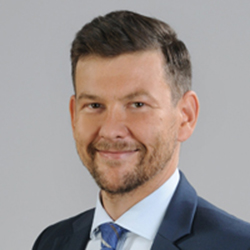
Habilitated Doctor MARCIN WOJTYSIAK-KOTLARSKI, Professor at SGH, Head of the Unit of International Strategies, Institute of Management, Collegium of Management and Finance of the SGH Warsaw School of Economics, Head of SGH Team for AACSB, EQUIS, BGA Accreditations.
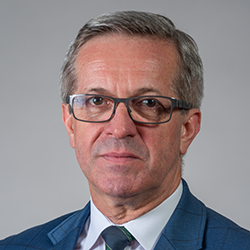
JACEK PROKOP,
Vice Rector for International Relations, SGH
Accreditation processes give us a unique opportunity to more deeply reflect on our Alma Mater. The preparation of documents and accreditation visits make us stronger, but also make us aware that there are some areas for improvement.
Accreditations are not a one-time phenomenon, they are a continuous process of improvement in all areas of the university operation.
The participation in accreditation processes allows us to present on the international forum the scope and quality of activities undertaken by our university staff, building at the same time the awareness of how important the accreditation is among the SGH community.
Internationally accredited schools (AACSB, EQUIS, AMBA) are pioneers in teaching, research and social impact. Thanks to obtaining AACSB, we have won the so-called third accreditation crown and thus confirmed our strong position of a business schools leader.
It is worth noting that the quality standards of business schools are constantly evolving, adapting to new educational models, ever-changing business needs, diverse requirements of lifelong learners as well as the rapid pace of development of new increasingly advanced technologies. The recent changes to AACSB standards emphasise the importance of the positive impact of business education on society.
International accreditations contribute to the increase in number of potential students, especially from geographically and culturally distant countries and to the development of research cooperation with the world’s leading business schools.


